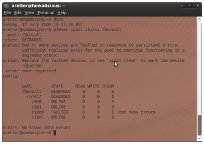Data 1, Disk 0
 After having finally built my NAS and had it happily working away in the background for a couple of weeks, it would
seem that failure has struck; one of the disks forming the ZFS RAIDZ2 storage pool
has failed! Whilst I am sure this seems a little ironic or sounds like a commissioned
advert for ZFS by Sun, I can only try to reassure you that this is not the case.
After having finally built my NAS and had it happily working away in the background for a couple of weeks, it would
seem that failure has struck; one of the disks forming the ZFS RAIDZ2 storage pool
has failed! Whilst I am sure this seems a little ironic or sounds like a commissioned
advert for ZFS by Sun, I can only try to reassure you that this is not the case.
Recently I experienced an unexpected crash with the NAS (no network response whatsoever), I am still unsure of the cause but have not had the time to investigate further. However, after powering the NAS off (ouch!) and back on again, I did take a quick look to make sure my data was intact by checking the zpool status. Unfortunately the bad news was that the pool status was reported as "degraded" with details of a failed disk, the good news however (and the whole point behind this setup) was that my data was fine :-)
I am fairly new to ZFS so I made some enquiries with the seasoned professionals in #opensolaris on FreeNode, to make sure that the errors I was seeing were definitely hardware related and not misconfiguration on my part. Whilst I was surprised that such a new disk would fail so soon, I was pointed to something called the "bathtub curve", which can be seen in chapter 4.2 of this paper. The "bathtub curve" basically follows that there will be high failure rates at the begining of a product's life (infant mortality) and at the end (wear-out); the statistics gathered in a further paper by Google entitled "Failure Trends in a Large Disk Drive Population" also seems to back this to a certain extent.
Overall I was glad to be reassured that this was a hardware failure and not a mistake on my part, and most importantly that I lost no data. The failed disk will shortly be replaced by the supplier, lets hope the replacement lasts a little longer.
Adam Retter posted on Sunday, 12th July 2009 at 17.50 (GMT+01:00)
Updated: Sunday, 12th 2009 at July 17.50 (GMT+01:00)






Comments (1)
Posted by Min Hsiao on Tuesday, 3rd November 2009 at 07.43 (GMT-08:00)